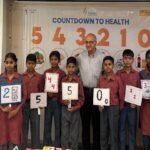A majority with the condition are unaware of it
New Delhi, May 10,2018: According to a preventive health programme conducted by a union health ministry, around 1 of every 8 people in India have high blood pressure. The results were drawn after screening about 22.5 million adults across 100 districts in India in 2017. The figures have increased significantly from the 1 in every 11 indicated by the National Family Health Survey in 2015/16. This indicates an urgent need for people to change their current lifestyles for achieving better health outcomes.
What is alarming is the fact that the screened population belongs to the rural pockets of India, where hypertension has so far not been reported as a significant health concern. The health ministry programme defines high blood pressure as a reading of more 140/90 mmHg; globally, even a reading of 130 is considered high blood pressure.
Speaking about this, Padma Shri Awardee, Dr K K Aggarwal, President, HCFI, said, “Many people with hypertension are not aware of the condition and therefore, the risk of associated long-term health complications such as heart disease. Treatment without a proper and timely screening cannot serve any purpose. In the absence of proper lifestyle changes, people can even become dependent on medication for life. High blood pressure imposes an up-front burden in people who know they have it and who are working to control it. It adds to worries about health. It alters what you eat and how active you are, since a low-sodium diet and exercise are important ways to help keep blood pressure in check.”
Perhaps because of all the ways hypertension interferes with health, the average life span for people with it is five years shorter than it is for those with normal blood pressure.
Adding further, Dr Aggarwal, who is also the Vice President of CMAAO, said, “High blood pressure is not a disease but a sign that something is wrong in the body. In some people with hypertension, the culprit is a narrowing of the arteries supplying the kidneys (renal artery stenosis), or an overactive thyroid gland (hyperthyroidism) or adrenal glands (aldosteronism). When these are treated, blood pressure drops back to normal. More often, though, doctors find no underlying cause for high blood pressure. This condition is called essential hypertension.”
Some tips from HCFI.
- Achieve and maintain a healthy weight for your height.
- Exercise regularly.
- Eat a diet that is rich in fruits, vegetables, and whole grains.
- Limit sodium intake to under 2,300 milligrams a day (one teaspoon of salt), and get plenty of potassium (at least 4,700 mg per day) from fruits and vegetables.
- Drink alcohol in moderation, if at all.
- Reduce stress.
- Monitor your blood pressure regularly, and work with your doctor to keep it in a healthy range.







